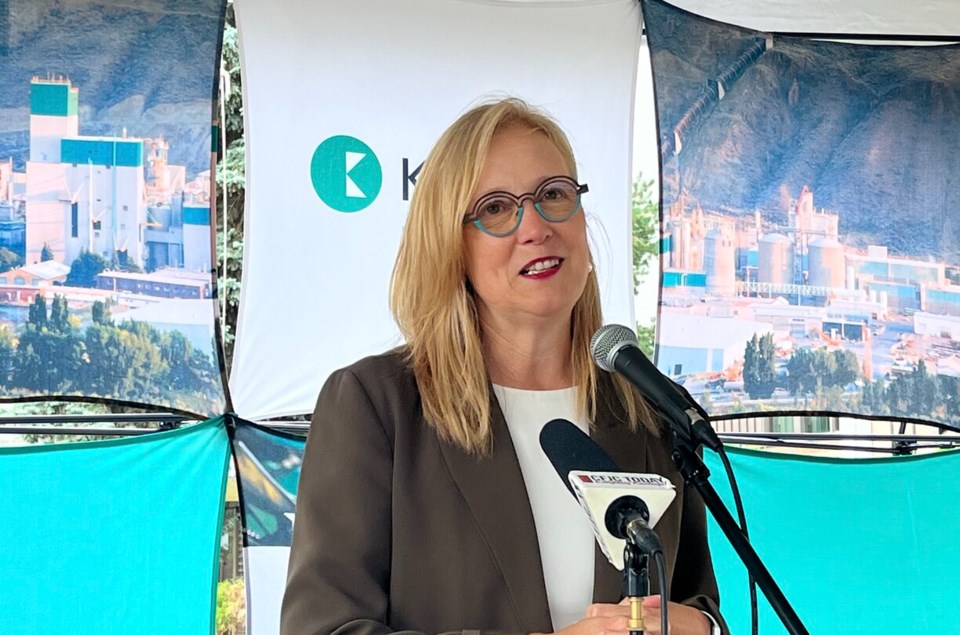It was hard to find any numbers worth bragging about in Finance Minister Brenda Bailey’s latest economic update Tuesday.
The economy? Showing signs of weakness. Revenues? Down, with slumping taxes and natural resources. Expenses? Up, under ever-growing health-care pressures. Employment? Slowing. Population? Growing. Consumer spending? Stumbling. Housing starts? Stalled. Global trade? Risky. And on and on it went.
The bottom line: B.C.’s record deficit projection of $7.91 billion in the pre-election budget is $1.5 billion further into the red, putting the province on the path for a super-duper-record deficit this year of $9.4 billion.
“There are challenges, without question, ahead of us,” said Bailey, a month into her new portfolio. “And I feel very fortunate to have the opportunity to work on those challenges.”
Challenges indeed. B.C.’s economic growth was revised downward to 0.9 per cent — which makes it the lowest in all of Canada, according to a TD Bank economic analysis released the same day.
Not quite what voters heard the BC NDP say during the election.
“We have, among big provinces, the fastest GDP growth in Canada,” Premier David Eby said in mid-October, while on the campaign trail.
“It doesn’t matter if you look at last year, since the pandemic or since we formed government, we have the fastest wage growth in Canada.”
Was the NDP honest about the state of provincial finances, or should voters be concerned they were sold a bill of goods on economic performance in the election that now no longer exists, Bailey was asked.
“We’re at a different moment,” said Bailey. “At this moment in time, where we’re seeing weak commodity prices and the effects of global inflation and increased interest rates and other factors.
“But I think what’s important is what the future can hold for us.”
Provincial economic growth, spending and revenue aren’t the only numbers that have suddenly changed now that the NDP won re-election. Two major transportation projects that government ministers insisted just a few months ago were on budget were revealed Tuesday to be — and hold onto your hats here — unexpectedly over-budget.
The Pattullo Bridge has increased $260 million, or 19 per cent, to $1.64 billion.
The Broadway subway line is up $127 million, or four per cent, to $2.95 billion.
In May, then-transportation minister Rob Fleming claimed both were still on budget, even though both were also two years behind schedule. “We’re thinking we’re pretty good in that regard,” Fleming told CKNW at the time. “We’ve been very aggressive in managing these contracts.”
Turns out, not so much.
Financial officials said the extended timelines produced extended costs. In the case of the Broadway line, the finance ministry admitted the cost overruns were known by the end of September. The figures weren’t shared with voters, presumably, because the writ had already dropped for the provincial election and the government was in caretaker mode — that is, assuming you believe this timeline.
“David Eby had to know this bad news was coming,” said Opposition Conservative finance critic Peter Milobar. “Voters deserved to know the truth.”
Bailey did her best Tuesday to explain a budget she inherited, economic projections that aren’t hers and promises in an election platform driven almost entirely by the premier. But there weren’t a lot of answers.
She argued B.C. can still afford to spend $1.8 billion issuing “grocery rebate” cheques of up to $1,000 per household next year despite the rising deficit projections, that there’s still a path to balance at some point in the future, and that a new hiring freeze in the civil service and drive to find internal efficiencies will produce savings in the next provincial budget in March.
On the last point, though, the minister found herself immediately embarrassed by her own premier’s office.
Rather than adhering to the public call for fiscal discipline and prudence, the premier’s office was caught giving raises to its political staff via cabinet order, boosting maximum salaries for at least two people from $157,100 to $173,500. There’s also rumblings that it has planned a new tranche of hires of political staffers with fancy new titles inside ministers’ offices.
The moves don’t match the public speaking points.
“Our budget is under huge pressure,” Premier David Eby told the B.C. Chamber of Commerce last week. “When you put it all together, the same pressure that families are feeling in their budgets, we're seeing that in government budgets as well.”
Apparently not though. Or at least, not when it comes to themselves. In a budget filled with worrying economic numbers, somehow, the government’s do-what-we-say-not-what-we-do attitude makes it even worse.
Rob Shaw has spent more than 16 years covering B.C. politics, now reporting for CHEK News and writing for Glacier Media. He is the co-author of the national bestselling book A Matter of Confidence, host of the weekly podcast Political Capital, and a regular guest on CBC Radio.





